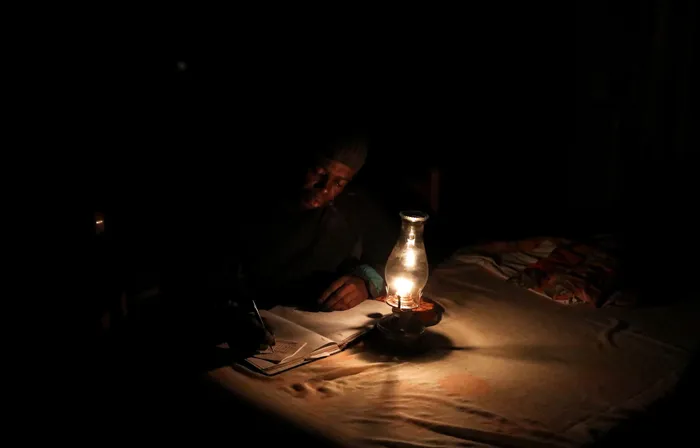ANC delivers a darker life for all

Picture: Siphiwe Sibeko/REUTERS – Soweto, Johannesburg resident, Mpumelelo Mapota works next to a paraffin lamp as South Africa's struggling power utility Eskom, implements regular loadshedding. The entire nation faces a darkness that holds no brief for the light of democracy or liberation, the writer says.
By Kim Heller
As millions of South Africans across the land prayed in their beloved churches this last Sunday, the chairperson of Eskom, Mpho Makwana, was delivering a sermon of doom. He announced that loadshedding is set to become the days of our lives for the next two years. South Africa’s 24-month calendar of dark days is a death sentence for many individuals and businesses who are already battling torrid economic times.
It is almost certain that South Africa’s national election in 2024 will be held under a power blackout. It is an appropriate staging for a nation that is loadshedding not only its electricity, water, and jobs, but it’s very own promise and the hopes and dreams of its citizens.
In July 2022, I wrote in The African that “For South Africans, it has been a winter of despair; a time of darkness after season upon season of lost hope. The once brilliantly lit prism of promise that lit the early skies of post-apartheid South Africa and the warm amber of a new-born optimism for justice and equity is no longer”.
The ANC’s promise of a better life for all has faded as surely as the Rainbow Nation itself. The entire nation faces a darkness that holds no brief for the light of democracy or liberation.
South Africa, with its ugly colonial and apartheid history, is a country which has swayed from fear to hope. From fear under the brute of vicious racist white regimes to hope under a democratic black government.
Centuries ago, the great philosophical thinker, Benedict de Spinoza said: “there is neither hope without fear, nor fear without hope.”
Today, almost thirty years later, there is a severe hope shortage in the country. Citizens fight and fear for daily survival and hopes for a better tomorrow are being crushed.
“Everyone is fed up," President Cyril Ramaphosa said, in his latest newsletter this weekend. A sorry response from the man in charge, whose frequent easy-speak promises of energy security have come to nought.
While the President continues to speaks of how the energy crisis is being resolved, investors are unlikely to buy into this talk show. Economist Dennis Dyke told Sowetan last week that investors are growing wary of unfulfilled promises. He said, “If you are a foreign investor, you got to be very sceptical about the chances of it is happening."
It’s a mess. Disinvestment is set to rise as investors look to more stable markets, food security is under threat and small businesses are in a state of collapse. Cosatu has issued a statement saying that South Africa cannot afford Eskom’s proposed loadshedding time frame. “The plan by Eskom for two (2) years of continuous loadshedding will be an unmitigated calamity. This does not only threaten to reverse the beginnings of the economic recovery and the 3 percent decrease in unemployment that we saw in 2022, but it also threatens to collapse countless SMMEs and send hundreds of thousands of workers onto the unemployment lines”, the Cosatu statement warns. A strong statement from a trade union that has taken its eye off workers’ rights in a sturdy support of Ramaphosa.
Cyril’s promise of a bright New Day has turned into a prolonged season of economic darkness, killed the spirit of the nation and put to death any flake of hope for a better life under the ANC.
Alan Paton’s Cry, The Beloved Country, published in 1948, on the eve of apartheid, poignantly portrays the dark days and grotesqueness of racism in colonial South Africa.
Although a novel in genre, not a work of non-fiction, the book nonetheless provides a real look into the daily torment of black South Africans under white rule during this particularly ugly historical epoch in the country’s history. The Britannica Encyclopaedia describes Paton’s book as a cry for South Africa, a cry for its people, its land, and the tentative hope for its freedom from hatred, poverty, and fear.
While the novel reveals the brutality of apartheid as an “unflinching portrayal of darkness and despair in South Africa, it still offers hope for a better future”.
Under both colonialism and apartheid, Black South Africans suffered untold misery. The history of hateful white rule in South Africa was a systemic blackout of black dignity. and well-being. The better life that democracy was meant to deliver to black South Africans is nowhere in sight. The grinding poverty, joblessness, and lack of prospects for a better life should not be the key features of a thirty-year-long democracy. But they are ever-present. It is painful to watch how the lives of ordinary South Africans, especially the poorest and most marginalsed, are being placed in jeopardy by ineffective governance of the economy, the energy grid, and other national infrastructure and services.
In Cry, The Beloved Country, Paton writes: “Happy the eyes that can close.” Right now, it is too painful to look upon the collapse that is all around us. The state of the nation is a crying shame.
Paton, writes in his book: “Who indeed knows the secret of the earthly pilgrimage? Who knows for what we live, and struggle and die? Who knows what keeps us living and struggling, while all things break about us?
For those who fought so hard for a free and just South Africa and sacrificed everything to see better days must feel broken and defeated, as darkness descends on democracy.
Heller is a political analyst and author of ‘No White Lies: Black Politics and White Power in South Africa’
This article is original to the The African. To republish, see terms and conditions.